

Living Memory: “Non-bishop” voters at the General Assembly | Synod on Synodality
Matthew Neugebauer
Saturday, May 20, 2023

Image by Christian R. Rodríguez on Cathopic.
In my last reflection, I looked at how the expansion of voting privileges at this October’s Synod of Bishops emerged from lay participation in previous Synods, and follows the consistent and near-inevitable path of the wide consultations at the Diocesan and Continental Stages of this Synod on Synodality. The communiqué announcing the change provides its own rationale, which I’ll quote at length and highlight in bold the key point I want to draw attention to:
This decision reinforces the solidity of the process as a whole, by incorporating into the Assembly the living memory of the preparatory phase [the Diocesan and Continental Stages], through the presence of some of those who were its protagonists, thus restoring the image of a Church-People of God, founded on the constitutive relationship between common priesthood and ministerial priesthood, and giving visibility to the circular relationship between the prophetic function of the People of God and the discernment function of the Pastors. Thanks to a better integration with the preparatory phase, the Assembly makes concrete the hope that it may be “an expression of episcopal collegiality within an entirely synodal Church.” (Pope Francis, Address on the 50th anniversary of the Synod) It is therefore in the role/function of memory that the presence of non-bishops is included, and not in that of representation.A few weeks ago, I explored why this rationale might seek to preserve “episcopal initiative,” that is, stressing that the Synod of Bishops is still “an expression of episcopal collegiality.” I should also mention that the comment about “representation” in the quote above is yet another expression of the concern that narrow, agenda-driven expectations will weaken communion and participation, and likely leave some people disappointed: it’s memory, not the representation of factions. I’ll do some more coherent reflecting on why the stress on episcopal initiative and the concern about agendas and expectations continue to be repeated. Right now, I’m most intrigued by the comment about "living memory,” since it’s a positive rationale for the 80-or-so non-bishop voters at the General Assembly, and more so because it describes a dynamic relationship between this Universal Stage and the Diocesan and Continental Stages. But what does "memory" mean in this context? Does it simply refer to our common understanding of the term, namely the cognitive recollection of something that happened in the past? If that were the case, then non-voting auditors would be enough to remind voting participants about what the diocesan consultations and continental Ecclesial Assemblies talked about, and what participants learned in those conversations. The phrase used in the communiqué is living memory, which points to a deeper, more traditional understanding of the term. It’s a lot like the Greek word anamnesis, a key element of Eucharistic theology, which describes the Holy Spirit's ability to move beyond time and through time to bring realities of the past to the here and now. Specifically, anamnesis is the way we partake of the Sacrifice of the Mass: “do this in memory of me.” The Holy Spirit brings us to the “event” of the Paschal Mystery: into the Upper Room on “the night he was betrayed” two millennia ago, to the Cross, and to Christ’s resurrected Body. Through the living memory of anamnesis (literally, “calling back” or “calling up”), the Holy Spirit brings the Paschal Mystery to us on every Altar throughout the world. “In the liturgical celebration of these events, they become in a certain way present and real.” (CCC #1363) To be clear, I’m not saying that the relationship between the Universal Stage with the Diocesan and Continental Stages is directly sacramental. What I mean is that the living memory at play in the communiqué’s rationale follows the same tried and true logic of “living memory” found at the “source and summit of the whole Christian life.” (Lumen Gentium #11) Both bishop and non-bishop participants will carry their involvement from the Diocesan and Continental Stages into the General Assembly in October, by continuing their work of spiritual listening, their ability to make in-person connections, and their pattern of meaningful contributions to this Synod. They have been, and will continue to be, "protagonists" in this synodal story. The communiqué continues: this living memory expresses “the constitutive relationship between common priesthood and ministerial priesthood, and [gives] visibility to the circular relationship between the prophetic function of the People of God and the discernment function of the Pastors.” It is, as I reflected on last year, the dynamic of tradition, of handing on, so that what happened in the past is truly given to the present. (I also noted, by the way, that St. Paul’s understanding of “tradition” in 1 Corinthians 11:23-25 emerges directly from his Eucharistic faith.) In the second part of that reflection, I described the coming together of bishops, clergy, and laity in this synodal process as a matter of partnering with all the faithful in matters of doctrine and especially in pastoral practice, deepening the contribution of lay people to that traditioning process of developing and handing on the faith to the next generation. This change, involving the laity in the Synod of Bishops to this degree, is itself part of the Holy Spirit’s “traditioning work” of leading the Church in a more collaborative, conversational – synodal, direction. It is a form of Newman’s idea of “consulting the faithful,” but develops it further, by helping everyone understand what it means for bishops to “express episcopal collegiality within an entirely synodal Church.” (Emphasis added.) May this development serve to enhance that ministry of oversight, that pastoral governance of the Church that the Holy Father and the College of Bishops continue to exercise. May it enrich the dialogue between “the prophetic function of the People of God and the discernment function of the Pastors,” by instilling an even greater sensitivity to the needs, hopes, and concerns of all the faithful, and therefore enabling the Church’s shepherds to respond with greater wisdom and courage.
Related Articles:
<<
SUPPORT LABEL
$50
$100
$150
$250
OTHER AMOUNT
DONATE
Receive our newsletters
Stay Connected
Receive our newsletters

Stay Connected









